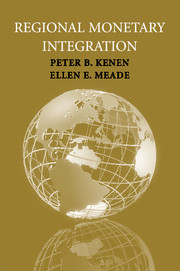Book contents
- Frontmatter
- Contents
- Tables, Boxes, and Chart
- Acronyms
- Acknowledgments
- 1 Introduction
- 2 The Forms, Costs, and Benefits of Currency Consolidation
- 3 The European Monetary Union
- 4 Monetary Arrangements and Economic Performance
- 5 Monetary Union in the Americas?
- 6 Monetary Integration in East Asia?
- 7 The Outlook and Implications for the United States
- References
- Index
7 - The Outlook and Implications for the United States
Published online by Cambridge University Press: 16 January 2010
- Frontmatter
- Contents
- Tables, Boxes, and Chart
- Acronyms
- Acknowledgments
- 1 Introduction
- 2 The Forms, Costs, and Benefits of Currency Consolidation
- 3 The European Monetary Union
- 4 Monetary Arrangements and Economic Performance
- 5 Monetary Union in the Americas?
- 6 Monetary Integration in East Asia?
- 7 The Outlook and Implications for the United States
- References
- Index
Summary
INTRODUCTION
In this book, we have explored the possibility and evaluated the likelihood of increased regional monetary integration over the next two decades. We have argued that economic and political conditions in most regions are not now conducive to the formation of additional full-fledged monetary unions, even among country groups that have strong trade ties. Obviously, monetary union in Europe is already well-established. However, further expansion of the euro area to include additional new EU members in Central Europe will present some challenges. In addition, there is the possibility of closer regional monetary cooperation in East Asia, even the formation of a monetary union among some or all of the ASEAN countries. In this final chapter, we look at the implications for the United States if the international monetary system evolves as we have predicted.
We begin by reviewing our reasons for believing that we will not see many new monetary unions. Thereafter, we examine what this is likely to mean for the U.S. economy, the international role of the dollar, and the broader issue of U.S. leadership and influence in the international monetary system.
WHY EMU IS NOT READILY REPRODUCIBLE
The birth of EMU in 1999 spawned a flurry of interest in the creation of monetary unions elsewhere in the world, not only among academic economists, but also in official circles and the private sector. This interest has diminished recently, however, for reasons set out in previous chapters.
- Type
- Chapter
- Information
- Regional Monetary Integration , pp. 179 - 198Publisher: Cambridge University PressPrint publication year: 2007



